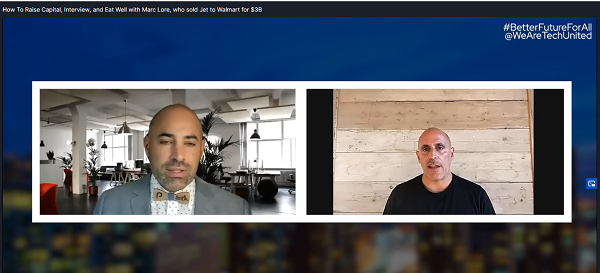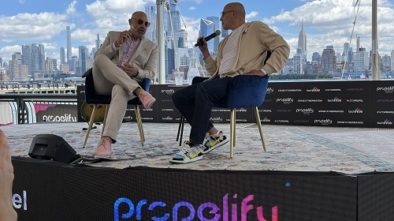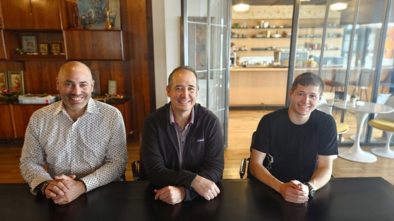At Propelify #BetterBeta, Walmart’s Marc Lore Talks about Job Interviews, E-Commerce and Entrepreneurship
A word to the wise: If you ever have an upcoming job interview with Marc Lore, don’t bother preparing in advance by Googling the most popular interview questions and answers.
According to Lore — as disclosed during his recent Propelify fireside chat with Aaron Price (founder of Propelify and president/CEO of TechUnited:NJ) — you will no doubt be wasting your time, as he thinks differently from most other senior executives.
Lore prefers to engage prospective employees in conversation and to keep them on their toes during the onboarding process. This, at least in part, explains his extremely enviable track record of corporate success — including how he came to land in his current role as president and CEO of Walmart eCommerce U.S., following Walmart’s $3.3 billion buyout of his previous e-commerce startup, Jet.com, which was headquartered in Hoboken.
Lore also achieved tremendous success at Quidsi (Jersey City), the parent company of several online shopping websites such as Diapers.com and Soap.com, all started in New Jersey. Lore was a direct target of another high-profile e-commerce takeover when Quidsi was bought by another huge online retailer, Amazon.com, for $545 million.
Let’s get back to prepping for your interview. Lore will very likely ask you an open-ended, conversational brain-teaser question to see how your thought processes work. One such possibility he has used in the past: How much money would you need to be paid to walk backwards for an entire week?
Lore and Team Launch Walmart+
Back to Walmart: Capitalizing on the big-box retailer’s sizable domestic footprint of more than 4,700 retail locations (including approximately 2,700 stores that currently offer same-day delivery), Lore and team recently unveiled a creative subscription model known as “Walmart+.”
This brand-new membership model capitalizes on the company’s formidable retail presence, with its strategically located stores, and its online prowess. The subscription costs $98 per year, or $12.95 per month, and prospective customers can even try it free for a 15-day trial period. Benefits include free same-day delivery and reduced automobile fuel prices, plus access to tools that make shopping even faster for families.
According to Lore, early on at Jet.com, before the Walmart buyout, the startup’s goal was to have a membership plan. However, the execs realized that the company could offer an appealing value proposition without bringing on members. “Our lifetime value of Jet’s customers was so strong,” he said.
“We strived to sell products that are not commoditized — less frequent sellers with higher margins — including long-tail products not typically found in brick-and-mortar locations.”
On Capital Raising
Price asked Lore for his take on fundraising. In response, Lore noted that the process had been tough on him, both mentally and physically. Early on, he accepted capital from friends and family members, but this came with added pressure, instilling a “can’t fail” attitude in him because he didn’t want to let people down.
Advising others, Lore stressed the need for fellow founders to tailor their pitches to the current developmental stage of their businesses.
In the seed phase, you should strive to convince prospective investors that you have a clear vision of where the business is headed and that you are the right person, with the ability to pull it off.
Don’t get hung up on financial projections, as they aren’t very important at this point, except to show a capital source how big you’re thinking. “Frankly, most projections at this stage are meaningless,” Lore said.
You are there to sell yourself. How committed are you? And how much skin do you have in the game? For example, can you afford to lose? Did you quit your prior job?
A good resume plus a good, clear vision are important, and is the fact that you are all in. This is a great combination. The sequencing of upcoming strategic moves is key during the early stage, which will lay the framework and foundation for where you and your business are heading.
His advice about what to avoid in a pitching session: conflating what you’re actually working on currently with where you expect to be in five years.
Future of e-Commerce and Tech
According to Lore, Walmart online revenues are growing extremely fast, reaching the high double digits in recent quarters. COVID-19 certainly acted as an accelerant, perhaps pushing Walmart eCommerce U.S. sales as much as three to four years ahead of schedule. But Lore insists that his team was already well prepared for the current environment, and acted quickly to capitalize.
Post-COVID, he thinks e-commerce will still continue to grow and accelerate next year and beyond. “So much tech is coming,” Lore said. “Autonomous vehicles and drone delivery should further push down e-comm costs. We are working on things like delivery direct to refrigerators and putting packages in homes on kitchen tables.”
Machine learning, voice tech, virtual reality and other types of tech should also propel e-commerce in the future, he said. “Some delivery robots are now able to walk upstairs. Autonomous vehicles will be used in a big way in the future, possibly delivering from below ground and drones from above.”
Working from Home, Advice to Other Entrepreneurs and Legacy Thoughts
Lore has been taking business calls and attending Zoom meetings while walking a lot during the pandemic, and this has added great flexibility to his routine. Exercise, diet and good sleeping habits are very important to your future success, he advised.
Working remotely from anywhere opens your mind to lots of possibilities. For instance, Lore would consider moving to the European countryside if he could take his personal life with him.
To someone starting a technology software company: “Any idea can work, but it starts with addressing a customer pain point, and then it’s all about the execution. There are so many off-the-shelf services that exist to help you start a tech business,” he said.
“Early stage success is all about the founders. How bad do they want it? And how committed are they? Will they walk through a brick wall? Tenacity, adaptability, and optimism – this is the X factor.”
“You can’t have a Plan B if you’re a true entrepreneur. It has to work. You need to
get into sixth gear. If the business doesn’t succeed … my life is over! Work/life balance — not everyone is good at that.”
Lore’s legacy? Creating a positive company culture. Bringing in great people and watching them develop. Seeing them later in their careers, when current and former employees are grateful for the experiences they had at his company, and have flourished. This is what ultimately drives him.
Shareholders and customers are important. But employees come first, while the other two are close seconds, he concluded.




